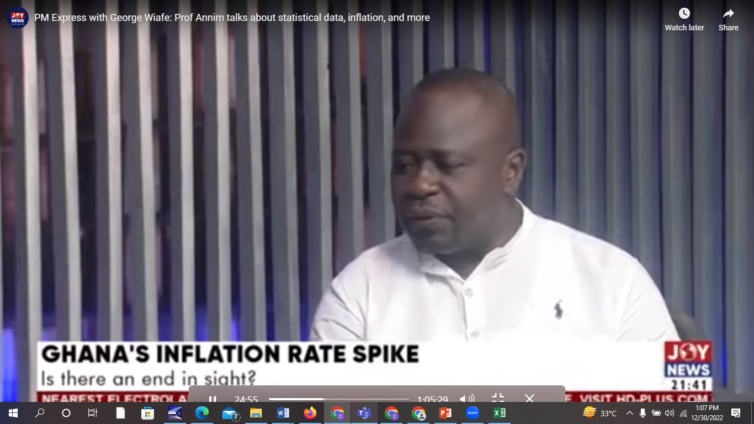
Audio By Carbonatix
Government Statistician, Professor Samuel Kobina Annim, says he cannot tell whether inflation has peaked or not.
Speaking on PM Express Business Edition, he said, it is only the historical data that can tell whether inflation has reached its highest limit.
“It’s a conversation everyone wants to have, whether we’ve peaked or not. Anytime we do the release, we get journalists asking these questions. Again, it’s not in my place to say yes or no. Just for three or four reasons anytime you want to talk about we’ve peaked, you need to ask yourself what does the historical data suggest?”
“We do it for internal purposes with a lot of caution based on what I said to you earlier, having seen a 9.9% jump [November inflation to 50.3%], I’ll be hesitant in saying that we’ve exhausted all the pass-through effects. This is exactly what I am saying”, he explained.
Continuing, Professor Annim also said despite the cedi gaining some grounds to the dollar in the month of December 2022, it does not mean inflation will come down in the month under review.
Improved cedi value does not translate into immediate fall in inflation
“I’ve heard people talking about why inflation is still going up when the exchange rate has slowed down. This is exactly what I tried explaining to you. If the cedi appreciates as we saw, it doesn’t automatically translate into the sellers bringing down the prices. It takes time for that to happen and that is what we mean by the pass-through effect and the other dimension is the multiple pass-throughs”.
Again, he said, “it takes time, and the other one is if the exchange rate drops, which commodities are affected and what are the weights of these commodities? When you have more than one item having an effect on the exchange rate, it gets complicated because you cannot exhaust the pass through effect from only the ‘spare parts’ point of view. If diesel [price] drops, you don’t expect only ‘trotro’ fares to automatically go down”.
Inflation hit 50.3% in November 2022, the biggest jump since the year 2000.
This was as a result of a significant increase in transport fares, utility tariffs and the exchange rate fluctuation.
Latest Stories
-
ECG completes construction of 8 high-tension towers following pylon theft in 2024
14 minutes -
Newsfile to discuss 2026 SONA and present reality this Saturday
22 minutes -
Dr Hilla Limann Technical University records 17% admission surge
30 minutes -
Meetings Africa 2026 closes on a high, Celebrating 20 years of purposeful African connections
34 minutes -
Fuel prices to increase marginally from March 1, driven by crude price surge
47 minutes -
Drum artiste Aduberks holds maiden concert in Ghana
1 hour -
UCC to honour Vice President with distinguished fellow award
1 hour -
Full text: Mahama’s State of the Nation Address
2 hours -
Accra Mayor halts Makola No. 2 rent increment pending negotiations with facility managers
2 hours -
SoulGroup Spirit Sound drops Ghana medley to honour gospel legends
2 hours -
ECG reinforces ‘Operation Keep Light On’ in Ashanti Region
2 hours -
UK remains preferred study destination for Ghanaians – British Council
2 hours -
Ghana Medical Trust Fund: Maame Samma Peprah ignites chain of giving through ‘Kyerɛ Wo Dɔ Drive’
2 hours -
A new children’s book celebrates Ghanaian culture and early literacy through food storytelling
2 hours -
Right To Play deepens fight against child labour through MLMR and MRMF projects
2 hours

